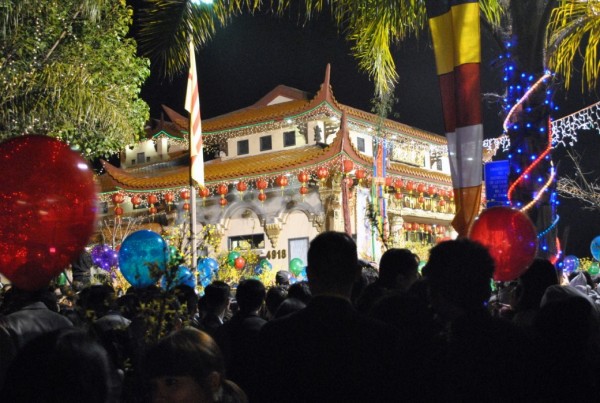
The Year of The Tiger was greeted with Joy and Grief

By OLEN KITTELSEN

Photo Quy V. Ly
Hue Quang Temple on Lunar Year Eve 2010
A cacophony of temple drums, firecrackers, and song greeted the “Year of the Tiger” on February 14 in Westminster, the large Vietnamese-American neighborhood in Orange County. Refugees from Communist Vietnam and their offspring welcomed their New Year, Tet, with joy and grief – joy over their success as an immigrant community, and grief over the loss of their homeland 35 years ago, their friends and relatives who drowned fleeing Vietnam in rickety vessel, and in many cases, their own torture experience in Communist captivity. OLEN KITTELSEN reports.
The air is filled with the smell of gunpowder as the firecrackers are lit, going off with loud consecutive bangs. People are cheerful as they trek from one temple to another. They have been looking forward to Tet, their highest holiday all year. They had bought new clothes, paid all debts, painted and cleaned their houses in anticipation. Now they are off to their temples to honor Buddha and celebrate with their friends and family.
It was a cold night in Westminster, but thousands squeezed into the Hue Quang Vietnamese Buddhist Temple to do their devotions and then watch the plethora of Vietnamese entertainers perform well past midnight. Tet is more than just New Year’s Day for the Vietnamese. During Tet, everyone celebrates his or her birthday, which is why many, especially the children, were dressed in their traditional, Ao Dai, robes which rate among the most elegant national garments in Southeast Asia.
The lunar calendar consists of 12-year cycles with each year bearing an animal’s name. This year, is the Year of the Tiger which was followed the Year of the Ox, which was preceded by the Year of the Rat.
It was the dawn of a Year of the Monkey, however, that the older Vietnamese in Westminster can’t help remembering with sorrow: Tet 1968, an event that was to change the course on the war in their country.
As in previous years, a three-day cease-fire between the South and North Vietnamese had been agreed upon in observance of Tet 1968. But the North Vietnamese broke this truce on the first day of Tet, launching a massive attack against 100 South Vietnamese towns and cities, including Saigon, the capital, and Hue, the former imperial capital. The North Vietnamese murdered thousands of innocent men, women, and children and then buried their bodies in shallow mass graves or left their bloody corpses in the street. An estimated 14,300 South Vietnamese civilians were killed along with another 24,000 wounded; as cited by Clark Dougan and Stephen Weiss in their book Nineteen Sixty-Eight. Despite heavy civilian losses for the South Vietnamese, the Tet Offensive was a major defeat for the North Vietnamese who lost approximately 45,000 men, their popular support, and their infrastructure in the South according to the Dr. Uwe Siemon-Netto of the Atlantic Times.
Vietnamese dentist and former member of the South Vietnamese army, Quy Van Ly, a 17 year old at the time said: “My first impression was, how could they do that on Tet? I knew there was a cease-fire, and both sides were supposed to honor the cease-fire, right?” Mr. Ly was living in Saigon the day of the attack; he said that the day after the initial attack, he heard on the radio that the Americans and South Vietnamese forces had been successful in pushing the North Vietnamese and Vietcong out of Saigon and that most of the attacks had failed. After the Tet Offensive, however, many Americans believed that the battle had been lost even though the offensive had been a terrible defeat for the North Vietnamese. “We lost the war because of the media, especially because of the media in the United States… They did not understand what was going on in Vietnam,” stated Quy. “It (the Tet Offensive) was like a suicide mission… but they (the North Vietnamese and Vietcong) got the political victory.” The Tet Offensive marked the beginning of the American withdrawal in Vietnam. “Without the Americans, South Vietnam could not withstand North Vietnam… 1968 was the turning point of the Vietnam War.” After the war, Quy spent 2 and a half years in a Communist re-education camp and was not able to come to America until 1991.
This year, The Vietnamese have become the second largest Asian community in the United States according to the US Census Bureau. This would not have been possible without the tens of thousands who fled their country and squeezed onto rickety boats after the fall of free Vietnam in 1975. Tony (Tru) Tran a physical therapy assistant at an Orange County skilled nursing facility was 14 years old when he escaped Vietnam with his family of 41 crammed onto a 12 by 5 meter boat in 1982. They were afloat 17 days. After 15 days with no food or water, they were rescued by Filipino fishermen and brought to the Philippines where he and his family lived in refugee camps in Palawan and Bataan for two years while waiting for documentation to migrate to America.
Hue Quang temple, an ornate white structure, was lit with red paper lanterns and decorative strands of colorful lights that hung all across the top of its roof. The courtyard was extremely crowded, still more people continued to make their way in well past 11 p.m. The sound of Vietnamese music could be heard from anywhere near the temple grounds as singers and dancers performed on the large stage outside the temple. Pyrotechnic engineers prepared long strings of fire crackers that hung down from the temple roof, set to go off at midnight. Food tables were set up in the parking lot adjacent to the temple, and the aroma of Vietnamese food filled the air. Native Vietnamese and visitors alike treated themselves to eggrolls, soup, rice, and sweet Vietnamese deserts.
Tet, while a time of great jubilation, is also a time for the Vietnamese to remember and honor their loved ones lost in a tragic war fought 35 years ago. “We visited the Vietnam War Memorial in Westminster and burned incense sticks for the remembrance of fallen comrades. My brother, first-lieutenant of the ARVN airborne paratrooper, was killed during the Vietnam War in 1972. We keep his picture on the family altar and did a small ceremony to honor him at home,” said Quy.